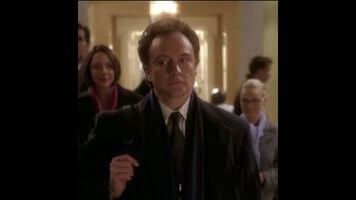The West Wing: "Mr. Willis Of Ohio"/"The State Dinner"

"Mr. Willis Of Ohio"
Who lives in America? What are all these people like? What do they all have in common? And, most importantly, what do they want? When The West Wing devotes an episode to a budget surplus, we get to see the White House staffers grapple with these questions, the answers to which define their careers in politics. If only understanding them were simple.
So we've got this administration full of Democrats, and all this extra money. It's time to start figuring out where it should go, and of course there are a lot of options: road construction; wildlife preservation; you name it. Our team is already on it, having composed a 7,000 page, 55 lb bill that spells out how this surplus will be spent. But even Donna, who watched Josh labor over the thing, is skeptical. See, the Republicans in the House would love to give that money back to the people in the form of tax breaks, and Donna agrees. ("I want my money!") Problem is, Josh is a staunch believer that the people won't spend the money wisely. If Donna finds herself with $700, she'll buy a new DVD player; Donna's money pooled with a bunch of other peoples', and now the government can build a much-needed hospital, or something. Even though Donna points out that her money would help the DVD player manufacturers employ hardworking Americans (assuming there was a strong American DVD player company), that's not enough. Why? "Cuz we're Democrats," he says. Translation: Americans, as a whole, don't have the best judgment.
But the wonderful thing about "Mr. Willis Of Ohio" is how it allows regular, ol' Americans to triumph in the end. Enter Mr. Willis himself, who took his wife's seat in Congress after she recently passed away. He, along with two other Democrats, are currently not supporting the proposed House appropriations bill, and all three have been summoned to the White House to meet with Josh, Toby, and Mandy. Their main beef is about the proposed changes to the census process: Done currently using door-to-door direct methods, the government wants to start doing random sampling, to account for the huge errors currently being racked up—homeless and inner-city populations are suffering the most neglect. The two other representatives just won't have it, and want to get out of the room right away; Mr. Willis, though, is open to listening, and tells Toby to "take his time," much to the others' chagrin. As it turns out, that patience becomes a virtue: He's the only one who understands Toby's argument that this is similar to the dated practice of counting all white land-owners as one, and three-fifths of everyone else—in the end, it's the less fortunate that will suffer. And because Mr. Willis is truly listening to what's being said—because he didn't enter the room with his mind already made up—he swings his vote back into the hands of the White House. He's a history teacher, after all; he understands the value of a good argument.
As much as this episode is about the refreshing joy of normalcy (as evidenced by the final scene, with Toby tuning in on the vote just to hear Mr. Willis make his one and only mark on democracy), it's also about the loss of it, specifically by Zoey Bartlet. She's just a 19 year old girl on her way to Georgetown, but she's the President's daughter. She wants to visit parents at home, but a crazed woman with a gun hops the fence with Zoey on her mind. She longs to go out with friends, even adds herself to plans involving Josh taking Charlie out for a beer, but even that simple outing goes awry. At said bar, an incognito Zoey leaves the pack to order CJ a grasshopper—the thickest of all bar drinks—but is intercepted by a band of bros led by the always slimy (except in 24) Eric Balfour, who want nothing more than to harass the hell out of her. And not Charlie; not Charlie and Sam; not Charlie, Sam, and Josh can tear them away, only the team of Secret Service agents that show up once they push the panic button Zoey's been carrying around.
Bartlet's argument with Zoey near the end of the episode brings Zoey's desires to the forefront. On the one hand, I completely understand why Zoey is furious; she just wants some space after all—how can she be expected to make normal friends in college with some gun-toting dude following her around? But Bartlet has a good point. If Zoey were to be, say, captured by terrorists, Bartlet would suddently have to deal with his role as a father, rather than making the tough calls as the nation's Commander In Chief. There's definitely nothing normal about that.








































